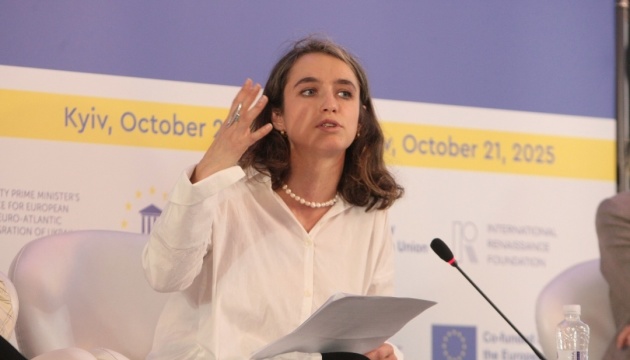
Ukraine should carefully study the tactics Russia used to interfere in Moldova’s electoral process and polarize society in order to be prepared to counter similar attempts during a potential pre-election campaign.
Anastasia Pociumban, a Moldovan analyst with the Germany-based DGAP think tank, said this in an exclusive comment to Ukrinform on the sidelines of the 4th EU Accession Exchange Forum in Kyiv, organized by the New Europe Center.
“Moldova’s example showed how much Russia is ready to invest to destabilize the domestic situation. And it’s not only about Russian narratives or pro-Russian agenda, it’s also about investing in different parties, in domestic narratives that appeal to different audiences,” Pociumban said.
According to her, Russia has grown skilled in assessing the “market of vulnerabilities and domestic grievances” to further exploit them. “Many say how Moldova’s population has been polarized but I wonder to which extent this polarization was fueled by Russia,” she added.
Reacting to the crackdown on financing of political forces with gray cash, Russia moved to cryptocurrency, thus making it harder to track illicit funding.
Also, Russia has been using Orthodox churches, engaging with clerics to spread their messages.
“I think around 70 churches now have Telegram channels and they also organize offline events. So this is a very creative measure,” the expert said.
The Russians have also engaged influences, including micro-level figures, on social media such as TikTok to promote their agenda, she said.
“There were even tarot card predictors who were hired,” Pociumban said.
At the same time, while amplifying grievances, Russia offers no solutions.
“They exploit the fears that people have, and I think we will see this a lot in Ukraine should there be some kind of a deal or ceasefire, Russia will use this to denigrate the government or civic society,” Pociumban said.
In response to Russia skillfully amplifying people’s fears, the expert offers to address those fears and offer other, positive narratives about the EU, rather than just combating Russian disinformation.
“Sometimes what they say is absolutely ridiculous, so we cannot go after each ridiculous narrative and combat it. But these narratives build on the fears that exist, so I think we have to go one step back and address the fears that are there, you know, and explain things to the population,” the DGAP expert said.
She separately noted the malign role of Telegram, which remains the top source of news for most Ukrainians.
“I think this platform will be very much used for disinformation, and you already have so many bloggers emerging on Telegram, and it’s thousands of channels that get followers, and they are micro-targeting people, which will be hard to tackle,” the expert concluded.
Parliamentary elections in Moldova took place on September 28, with the ruling pro-European Action and Solidarity Party (PAS) winning despite large-scale Russian interference attempts.
Moldovan Ambassador to Ukraine Valeriu Chiveri said Russia resorted to bribery, propaganda, and intimidation on an even larger scale than during the October 2024 presidential elections.


